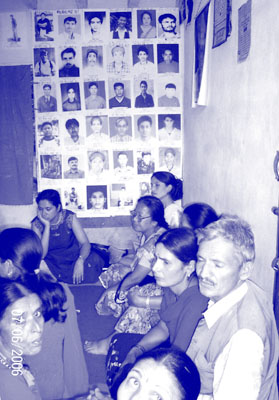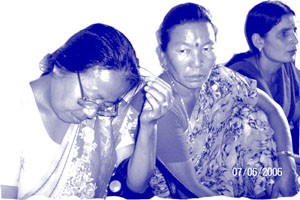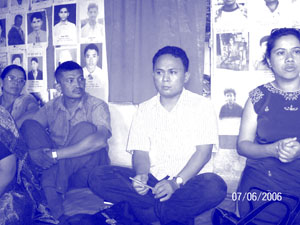|

EDITORIAL
COVER STORY
- A Precious Gift to Humanity
INTERNATIONAL SOLIDARITY
- The Other Side of the Kingdom
- Convention Now!
AFAD FEDEFAM
Together Now!
- Tying the Future with the Past
- Getting Back on Track
INTERNATIONAL LOBBY
- Still Fighting
- In Memory of the Disappeared
- The Power
of One
PHOTO ESSAY
- Protect All Persons From Enforced Disappearances
NEWS FEATURES
- Building on Nilo’s Legacy
- Filipinos Fight Against Disappearances
- Justice Suspended
- The Munir Murder
- Another Case of Impunity
STATEMENTS
/REPRINTS
- FEDEFAM Statement...
- An Open Statement to the GRP and NDFP Panels ...
- Parvez Imroz’ Award...
Asian Federation Against Involuntary Disappearances
Asian Federation Against Involuntary Disappearances
Asian Federation Against Involuntary Disappearances
Asian Federation Against Involuntary Disappearances
Asian Federation Against Involuntary Disappearances
Asian Federation Against Involuntary Disappearances
Asian Federation Against Involuntary Disappearances
Asian Federation Against Involuntary Disappearances
Asian Federation Against Involuntary Disappearances
Asian Federation Against Involuntary Disappearances
Asian Federation Against Involuntary Disappearances
Asian Federation Against Involuntary Disappearances
Asian Federation Against Involuntary Disappearances
Asian Federation Against Involuntary Disappearances
Asian Federation Against Involuntary Disappearances
Asian Federation Against Involuntary Disappearances
Asian Federation Against Involuntary Disappearances
Asian Federation Against Involuntary Disappearances
Asian Federation Against Involuntary Disappearances
Asian Federation
|
|
INTERNATIONAL SOLIDARITY: |
|
|
by Mugiyanto |
|
|
The Other Side of the Kingdom
|
| |
"We want the
international community and the UN not to only hear our grief but to also
do something about it." - A father of three disappeared men |
|
In
the south of Asia, surrounded by the grandeur of lush vegetations and
mountain
ranges, lies the beautiful Kingdom of Nepal. Considered as the only
official Hindu
state in the world, it is bordered in the east, west and south by India
and in the
north by China. Its diverse terrain has attracted many travelers to
explore the wonders of its Terai plains and Himalayan ranges. It has eight
of the world’s ten highest mountains including the Mt. Everest. However,
hidden behind these scenic attractions and impressive world records are
dark and bloody traces of violence and human rights abuses.
Pattern of disappearances
 Hidden
in the Kathmandu valley are the Maoist rebels who waged a guerilla war
against the government. It sought to overthrow the feudal institutions and
establish a republic. Over the last decade, fighting between the Maoists
and the Royal Nepal Army together with the police has intensified. A state
of emergency was declared on 26 November 2006 causing worst human rights
violations. Then, in 2005, its present ruler, King Gyanendra campaigned to
wipe out insurgencies. Under this pretext, he abolished the parliament,
removed the elected prime minister, took on all executive powers and
placed the country on a state of national emergency. A pattern of enforced
disappearances ensued. Scores of people were arrested by security forces
and disappeared for weeks, even months without access to relatives,
lawyers or doctors. Some who never surfaced are believed to have already
been killed. Those disappeared throughout the country included farmers,
students, teachers, lawyers, political activists, children and members of
different ethnic groups.
Since May 2006, the country’s National Commission on
Human Rights reportedly received 1,234 cases of disappearances. And in
2003, Nepal held the highest number of disappearance cases in the world
according to the United Nations Working Group on Enforced or Involuntary
Disappearances.
 Government security forces commit majority of the
disappearances. However, instead of taking action to prevent such severe
abuses, civilian authorities focused on issuing denials and covering up
the violations. Until now, no senior officer has ever been prosecuted and
punished. The government has much to account for as well. Even if it did
not give the security forces direct orders, its failure to end the
practice, protect the people and prosecute the perpetrators make them
accomplices. They are responsible for the crime as much as the police and
military. In the face of such government inaction, disappearances can
fairly be characterized as government policy.1 Government security forces commit majority of the
disappearances. However, instead of taking action to prevent such severe
abuses, civilian authorities focused on issuing denials and covering up
the violations. Until now, no senior officer has ever been prosecuted and
punished. The government has much to account for as well. Even if it did
not give the security forces direct orders, its failure to end the
practice, protect the people and prosecute the perpetrators make them
accomplices. They are responsible for the crime as much as the police and
military. In the face of such government inaction, disappearances can
fairly be characterized as government policy.1
AFAD visit
In June 2006, AFAD visited Nepal. Its mission: to
extend possible assistance to the many families and victims of
disappearances. As the Federation’s representative, I primarily
coordinated with Advocacy Forum, an NGO working to promote the rule of law
and human rights in Nepal, AFAD was able to meet the families and other
organizations.
Founded
in 2001, Advocacy Forum has been one of the most active organizations
working on the issue of disappearances and fighting impunity. It documents
cases of human rights violations, monitors detention centers, and provides
legal aid to the victims. From July 2001 to April 2006, it documented
5,682 cases of human rights abuses committed both by security forces and
Maoists such as extra-judicial killings (198), involuntary disappearances
(335), torture (2,271), rape of women (41) and illegal detention (2,837).
For disappearances in particular, the organization
conducts research and advocacy work in the national and international
level. It also organizes victims and relatives of the disappeared.
The Centre for the Victims of Torture (CVICT) also
helped facilitate my visit. CVICT was established in 1990 as an NGO which
aimed to rehabilitate victims of trauma and torture. It provides medical,
psychosocial treatment and legal services to all who are in need
regardless of their gender, age, caste, religion, ethnicity, economic
status or political affiliation.
Reaching out
Through these two organizations, I met 25 affected
family members in Kathmandu. The members were mostly women. I introduced
AFAD and its members to this group. I listened to their personal stories
of agony and grief. A 60-year old man shared his story about the
disappearance of his three sons in 2003. His sons were all members of the
All Nepal National Free Student Union – Revolutionary (ANNFSU-R). He said
that they were arrested in public places by plainclothesmen. He
immediately reported what happened to the International Committee of the
Red Cross, Amnesty International, the National Human Rights Commission and
local NGOs. He also filed a petition for Habeas Corpus. After 19
months, the RNA reported that they have detained one of his sons, Birendra
Basnet, in the military detention center of Bhairabnath. He was released
later in December 2005 under a Supreme Court order.
But the search for the other two sons, Puspha and
Dhirendra, has remained futile despite a testimony of a witness presented
before the Office of the High Commissioner for Human Rights (OHCHR)
confirming that all three sons were detained in the same center.
I sat amongst them, a witness to their sense of
conviction and commitment to fight for truth and justice. They also
expressed their plea to the international community to support their
struggle against disappearances and for the institutionalization of
democracy in the country. This particular father urged the local and
international organizations to not just observe and listen but to do
concrete actions to stop the disappearances and other undemocratic
practices in Nepal.
I,
in turn, presented to them the functions of AFAD. I explained that as a
Federation working in a continent riddled with disappearance cases, AFAD
still has much to do. And it needs to draw much strength from the peoples
of Asia. In this light, AFAD hopes to expand its memberships to as many
organizations in the region and extend its assistance to more families in
need. I encouraged them to join the Federation and let their voices be
heard, echo in other parts of the world and be united with the other
families in the universal pain and struggle for justice.
The families, indeed, signified their eagerness to join
the Federation. According to Bikram Tuladhar from Advocacy Forum, families
have already been organized. Advocacy Forum has already filed its
application as a member of AFAD. Deliberations are scheduled in December
in time for the Federation’s Third Congress.
Strength in numbers
 AFAD hopes that opening up its network and membership
to other countries such as Nepal will help boost the Federation’s campaign
against disappearances and impunity, as well as its intention to uphold
the victims’ rights. AFAD shall serve as the channel for the victims to
reach out to the other families in Asia and in other continents, to give
their support and assurance of solidarity. AFAD hopes that opening up its network and membership
to other countries such as Nepal will help boost the Federation’s campaign
against disappearances and impunity, as well as its intention to uphold
the victims’ rights. AFAD shall serve as the channel for the victims to
reach out to the other families in Asia and in other continents, to give
their support and assurance of solidarity.
For Nepal in particular, AFAD guarantees its full
support in stopping disappearances happening in the country and in
demanding state accountability especially in its transitional period
following the April uprising to strip the King of his absolute power.
With more nations in this fight, AFAD looks forward to
a more united line of struggle for the adoption of the International
Convention for the Protection of All Persons from Enforced Disappearances
by the UN General Assembly as well as for its ratification by state
members especially the Asian countries.
(Footnotes)
1 Amnesty International Report, "Nepal: Widespread
Disappearances" in the Context of Armed Conflict"
|
|
Mugiyanto is the founding
chairperson of IKOHI. He himself became a victim of involuntary
disappearance when he was kept in secret detention , during which he was
physically and psychologically tortured by the Kopassus immediately after
the fall of Suharto in 1998. three months after, he was released.
|
|
The
Voice |
Vol. VI No.1 November 2006
|
|